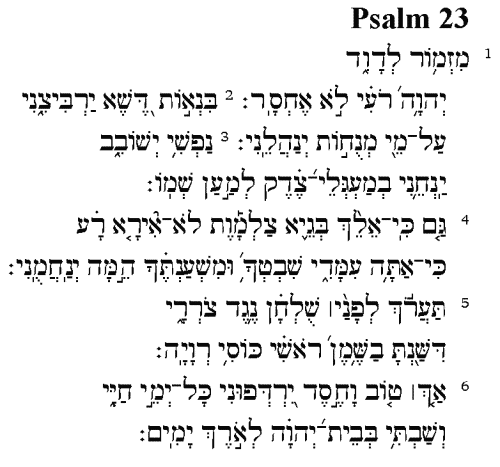And beginning with Moses and all the Prophets, he interpreted to them in all the Scriptures the things concerning himself…Then he said to them, “These are my words that I spoke to you while I was still with you, that everything written about me in the Law of Moses and the Prophets and the Psalms must be fulfilled.” Then he opened their minds to understand the Scriptures. (Luke 24:27, 44-45, ESV).

I have often wondered what the men on the road to Emmaus (not to mention Jesus own disciples!) must have been thinking to themselves when Jesus explained the vast contours of the Old Testament as speaking about himself.
I also wonder if it might have been faintly analogous to the new seminary student who feels like he has a decent grasp of the whole Bible…only to discover that was not the case after the first class of
Meredith Kline’s Pentateuch course.
Wonder? Confusion? Excitement? Anger? Amazement?
If there was an ‘Emmaus Road’ event in the Westminster curriculum, it would have to be Dr. Kline’s Pentateuch class that all new students took in the Spring semester of their first year. I suspect many a student of Dr. Kline’s over the years can trace their own understanding of the Law, the Prophets, and the Writings as beginning (in some sense) here. Many (including myself) have not been able to read the Bible the same ever since. Our minds were opened to understand the Scriptures!
When I started in the Fall of 1997, the build up was already beginning for Dr. Kline’s ‘decent’ upon Westminster California in the Spring. Upper classmen started telling us ‘newbies’ things like, “Prepare for the ‘Eschatological Submarine’!” or “Don’t sit on the front row in class, or the Glory Cloud might consume you!” I remember asking an upper classman where Dr. Kline spent the rest of the year, and the student responded: “Supposedly he has a house back East; but we think he’s actually recharging in the Upper Register.” [What is a new student suppose to make out of that?] I distinctively remember a number of first-year students saying they were going to try to get a jump start on the Spring semester by reading Professor Kline’s massvie
Kingdom Prologue, the main textbook for the course. Note especially that word,
try!

On the first day of class in the Spring, Dr. Kline proceeded into one of his ‘majestic’ prayers that would characterize the beginning of each one of his classes; and this surely gave credence to the rumor that Dr. Kline spent the rest of the year in the Upper Register! He soon announced that this was his 50th year of teaching, which only added to his aura. I recall looking around the room and saying to myself, “This guy has been teaching longer than any of us has been alive!”
Much has been made about the ‘wordy-hyphenated’(!) writing style we encountered in accessing Dr. Kline for the first time. For sake of brevity here, none such examples will be cited! However, for all the difficulties one encountered in reading Kline for the first time, I found his lectures extremely helpful at clarifying what we were trying to comprehend in
Kingdom Prologue. I, along with a number of other students who had Dr. Kline as a professor, have commented on the difference in level of comprehension among those who only read Kline and those who were actually taught by him in the classroom. His ability to explain things via his near-frantic use of the chalkboard is something that only his students were able to encounter; however, in the midst of the chalk dust clarity came. I privately wonder if many who still have such a disparaging view of Dr. Kline would have that spirit of criticism if they had sat under his teaching for a semester or two.
In 1997, one of the big issues circling the campus (and our Reformed denominations at large) was the Framework interpretation of Genesis 1 and 2. For many, this issue was (and still unfortunately is) the
sin qua non of Dr. Kline’s theology. I have often thought it unfortunate that those who found themselves at odds at this point with Dr. Kline have often failed to consider whatever else Dr. Kline might have to say about the Bible. Such neglect is really to their own detriment, for it really fails to see the importance that Covenant Theology played in the overall thrust of Dr. Kline’s theological endeavors.
Never one to run from controversy, Dr. Kline always displayed cordiality towards those in the classroom who would openly challenge (and sometimes with a certain amount of hostility!) the views presented in the lectures. Kline never responded with vitriol or sarcasm but calmly attempted to answer the objections raised. There was one particularly memorable outburst in which a student rather rudely declared, “Dr. Kline, thank you for correcting God!” I fully expected that this student might have finally pushed Dr. Kline over the edge. And if there was ever a case for a professor to put his student in his place, this was it. But Dr. Kline politely said he was sorry that the student felt that way, and that he would be happy to take up some of those objections after class. If patience towards difficult and ignorant students had any meritorious value in final justification, then Dr. Kline might very well have set the bar so high that few others could achieve it. (Thankfully, his covenant theology new better than to trust in such Spirit-wrought patience!)
Conversations with Dr. Kline after class were always a strange combination of brilliance and humor. I recall telling him one day after class that I found out about a PCA church that was using his By Oath Consigned in their membership introduction class. He immediately shook his head, and in smiling disbelief retorted, “Oh, those poor people!” He also had a large number of quotable zingers, my favorite of which was: “Theonomists don’t want to evangelize the world; they want to destroy it.”
Now nearly a decade removed from Dr. Kline’s teaching, I’d like (in good Klinean fashion) to highlight ‘seven’ ways in which Dr. Kline’s teaching has been instrumental in my own life. [Note, they do not follow a triadic (3+3+1) pattern!]
First, I arrived at Westminster as something of a ‘recovering dispensationalist’! I had read and studied enough from within dispensationalism to realize that it was wrong, but I wasn’t really sure what should be put in its place. Dr. Kline provided the structure I needed to realize the errors of dispensational bifurcation without throwing away legitimate covenantal discontinuities in the process. Few (if any) understood the basic errors of Pre and Post-millennialism as well as Dr. Kline. Reflecting over the past 8 or so years on all of the covenantal confusion that persists under the broad umbrella of so-called Reformed theology, I realize now how insightful (and helpful) he was in helping me understand Covenant Theology was not an imposition of the Reformers but rather was the result of careful reflection of the Scriptures. And when detractors accuse Dr. Kline of being a ‘leaky-dispensationalist’, it makes me seriously doubt that they are reading him (or the Scriptures) carefully.
Second, Dr. Kline was always rigorously exegetical in his approach. Never one to simply rest on the laurels of century old Confessional documents, Dr. Kline was resolutely interested in explaining theology from the text within the larger redemptive-historical panorama of Scripture. His classes reinforced this method from start to finish. Dr. Kline’s insistence on being first and foremost Biblical has been an extremely valuable lesson, particular as I interact with Christian laymen, as well as Christian academics, who know very little about the Reformed Faith.
In many respects, Dr. Kline’s exegetical rigor came at precisely the time when my ‘historical traditionalism’ needed a good slap in the face. At a time that I was very much looking for theological stability in the glories of past church history (ancient, medieval, Reformation, post-Reformation, Modern, Postmodern, etc.), Dr. Kline stood as a stark reminder that all traditions must always subject themselves to exegetical scrutiny…even his own teaching. If anything this has given me a greater appreciation for our Reformation forefathers and their attention given over to expound the Scriptures.

Whether exploring of the oft-mysterious work of the Holy Spirit in his
Images of the Spirit, the role that covenant plays in establishing the canon in
The Structure of Biblical Authority, or the eschatology of Zechariah's night visions in
Glory in our Midst, at every point Kline never failed to argue his point from the text of Scripture.
Third, Dr. Kline was passionate in defending the Protestant doctrine of Justification by Grace alone, through faith alone, in Christ alone. These were doctrines that I would have heartily affirmed when I first set foot on the Westminster campus, but Dr. Kline explained these in all of their Biblical-Theological fullness. I’ve encountered a number of people since seminary that were convinced that Dr. Kline’s criticism of Norman Shepherd’s views of justification was personal, when in fact it was nothing of the sort. Dr. Kline had one unified interest: to speak clearly on the question of the grounds of the believer’s justification before God; and, conversely, to speak out against any theologies that might detract from clarity on justification.
In recounting the details of the Shepherd Controversy, Dr. Kline understood from the very beginning precisely what was at stake – the Gospel of Jesus Christ. But it was his covenantal understanding of the issues that made his contribution to the discussion so vital. I distinctively remember him explaining the importance of the ‘Covenant of Works’ insofar as it provides the covenantal backdrop for the active obedience of Christ imputed to the believer, and how Mr. Shepherd’s system of theology completely obliterates this. Interestingly, Dr. Kline first pointed out this error in Shepherd’s theology a quarter-century before Mr. Shepherd finally came around to explicitly denying Christ’s active obedience as part of the righteousness imputed to the believer. Dr. Kline’s understanding of the Scriptures within their Covenantal framework enabled him to see the logical end of errant theologies of justification, sometimes long before they realized it for themselves.
Fourth, Dr. Kline was the final lynch pin in convincing me of the paedobaptist position. I read John Murray’s
Christian Baptism, as well as a few other standard books on the subject, prior to my coming to seminary. But none of those were successful in convincing me of the issue. Once Dr. Kline explained baptism within the dual sanctions of God’s covenantal dealings with man (e.g.
By Oath Consigned), the ducks finally started to line up and make sense. Connecting baptism to the story of redemption made for a tour de force argument for paedobaptism. Few (if any) other works on the subject of baptism take notice of this, and his unique contribution on this very point makes so much sense out of NT passages that are difficult for many to understand.
Fifth, Dr. Kline modeled Reformed Old Testament scholarship in a way that was (and still is) so uncommon when you compare it to the hodge-podge of evangelical Old Testament scholarship done today. As one who continued on after my time at Westminster in the field of OT studies, it is virtually the universal norm that you have on one side the Semitic scholars who have precious little interest in theology, and on the other side you have the so-called ‘OT theologians’ who abstract interesting propositions without any careful examination of the text. Thankfully, Dr. Kline knew better than to divorce theology from Semitics. He was rigorous in his demands of students to know the Hebrew from the passages we were covering in class. I remember talking to him about doing graduate work in OT, and his advice to me was to devote my time to studying Semitics….and to use that as the basis for later theological reflection in writing. That nicely summarizes the basic approach that Dr. Kline modeled again and again – the best Biblical theology is one that is rooted in the text, informed by the various covenants in Scripture, and unveiled as part of the unfolding story of redemption from Genesis to Revelation!
It has become one of my 'unofficial' habits to read through
Kingdom Prologue once a year. Now going on 8 or so years of doing so, it is remarkable that I continue to find exegetical and theological nuggets of profundity that I somehow ‘missed’ upon previous readings. It makes me wonder how much of KP I truly grasped when I first read it in 1998. 20%? 10%? This highlights how sorely ignorant we (the church) are of genuinely insightful reflections on OT (and NT) theology. The problem that people continually have with Dr. Kline exposes our unfamiliarity with the principal data (the Scriptures) of our theology. Far from ‘fanciful exegesis’, Dr. Kline dared to explain in the text what few others would.
Sixth, Dr. Kline’s insights into the ‘works principle’ in the Mosaic covenant are among the more controversial aspects of his theology, but they have proven beneficial to myself when I began to actually work through various parts of the OT, whether it be the book of Leviticus, the book of Joshua, or the prophesy of Zephaniah. The seminary curriculum did not permit Dr. Kline the occasion to work through each of these books with the students. And yet the way in which he taught the OT enabled me (and surely countless others) to move into these other portions of scripture with understanding of the ‘big picture’ of life under the Mosaic epoch.
 Seventh
Seventh (and lastly, following the esteemed Dr.’s love for the ‘sabbatical rest’ pattern of Scripture!), one could not conclude any reflections of Dr. Kline without mentioning his love for the Book of Revelation. That raises a most conspicuous question – since when does an OT scholar of Dr. Kline’s caliber cite a NT book as his favorite text? But this explained so much about Dr. Kline’s love for Biblical theology and its God-ward, heaven-ward trajectory. When you look at the warp and woof of Dr. Kline’s impressive resume of ground-breaking OT work – the Imago Dei in Genesis 1, the Covenant of Creation under Adam, the common grace covenant with Noah, the ratification-oath-pledge by God to Abraham in Genesis 15, the Suzerain-treaty form of the Works-covenant under Moses, the intrusion of curse-ethics under the Canaanite conquest, the little-apocalypse of Isaiah 24-26, the eved-YHWH of Isaiah, the protological-prosecutorial-eschatological role of all the Prophets, and many, many other themes/texts – it should be clear why Dr. Kline would love any book of the Bible that is capable of bringing all of these organic strands of OT revelation together with vivid apocalyptic brilliance, anti- and arch-typical fulfillment, eschatological resolution, and Christo-centric finality. How could one not love the Book of Revelation as a result?
It is indeed fitting that the final chapter in his final work (unless a posthumous work surfaces!) in
God, Heaven, and Har Magedon – one third of the book no less – was devoted to the grand ‘Messianic finale’ as given in Revelation. This is Dr. Kline at his best, still sharp as ever at the end of his earthly pilgrimage, still motivated to expound the glories of the resurrected Christ seated in the heavenly places!
We give thanks for the allotted time given by the Lord for Dr. Kline’s long ministry to so many students over the decades here in the ‘lower register’! Though we grieve the loss of a great servant of the Lord, we rejoice in the hope that so saturated Dr. Kline’s teaching from beginning to end:
“We have a building from God, a house not made with hands, eternal in the heavens.”
(II Cor. 5:1)
“For Christ has entered, not into holy places made with hands, which are copies of the true things, but into heaven itself, now to appear in the presence of God on our behalf.”
(Heb. 9:24)
“Blessed are those who wash their robes, so that they may have the right to the tree of life and that they may enter the city by the gates…The Spirit and the Bride say, ‘Come.’ And let the one who hears say, ‘Come.’ And let the one who is thirsty come; let the one who desires take the water of life without price."
(Rev. 22:14,17)
Dr. Kline’s homecoming has begun, and no doubt he is loving the ‘indoxation’ of Heaven even more than he could ever had done so while speaking about it as a 'pilgrim' on the road to glory.
As he was often heard in class praying, “Even so Lord, come quickly!”
_______________________
Matthew Ashley Morgan
April 19th, 2007
for the Westminster Alumni Reflections of Dr. Kline,
to be given to his wife and family

























































